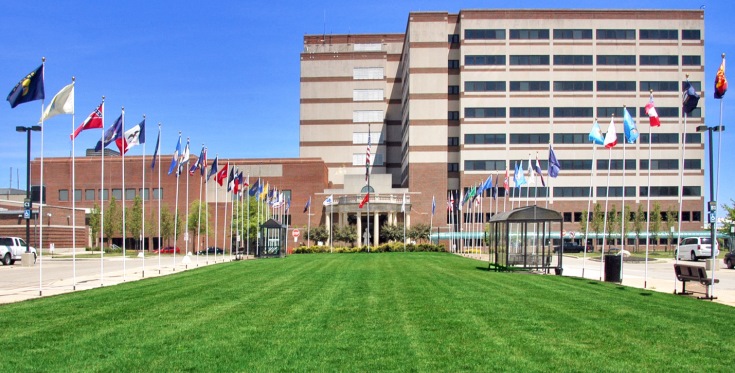I had been in the Air Force for a little under four years. Never in my wildest dreams would I have predicted that I would be receiving the news that I had Multiple Sclerosis (MS), but that is exactly what happened. My initial MS symptom was mild. I had a little weakness on one side, which I attributed to working out too hard or from carrying toolboxes as an aircraft avionics technician.
The second symptom was not as easy to ignore. After my weakness subsided, I developed optic neuritis in one eye. My vision was shot and the pain of moving my eye from side to side was agonizing. Once I communicated my symptom to my doctor, everything moved fairly quickly, with labs and scans culminating with a lumbar puncture (spinal tap). Following the tests, my doctor confirmed that I had MS.
From the time of my initial symptoms to my confirmed diagnosis, I was blessed by a support system that was solid. My husband stood by me, my parents provided me much needed reassurance and prayer, and I was able to continue my service in the military.
“My MS was not a weakness but an advantage.”
Serving with MS taught me the true meaning of “everyone is fighting a battle you cannot see” because that person was now me. I was privileged to be able to serve 20 years in the military, 16 of those years with MS, before being medically retired.
For a long time, I treated my MS diagnosis as an inconvenient weakness that I could ignore. As time went on I learned that my MS was not a weakness but an advantage. I learned to embrace my new normal and recognized that I am not limited in what I can accomplish. I just need to do things a bit differently. I realized the importance of extending myself grace which, at times, means saying “I need to rest,” and understanding that I am not being selfish but practicing self-care.
MS steals a lot of my energy. My biggest struggles are extreme fatigue, which results in my cognitive functions not being as sharp as I like and general depression with anxiety. I was not able to manage these challenges until I acknowledged them and accepted them. My saving grace in managing my fatigue is good coffee (caffeine and I are great friends), daily routines and most importantly: planning. All of these aid me in managing my energy depletion.
To cope with my depression and anxiety, I began recognizing my triggers and found my voice to express myself when the feelings were too overwhelming. Aside from these things, I keep my VA care team informed to ensure my treatments are effective. I also call on my support system because they are always there to help.
“The care from VA is seamless.”
Upon transitioning from active duty military to retired military, I was apprehensive about how my overall care would be managed as a disabled Veteran. Thankfully my nervousness was quickly put to rest. The standard of care I receive from my VA neurologist based out of Philadelphia (I reside in Texas) is seamless.
The level of accessibility via telehealth video calls and email messaging makes reporting my concerns extremely easy and convenient for which I am extremely appreciative. It makes it more effective for my primary care practitioner to collaborate on my care, keeping everyone on the same page.
Ultimately, we all have our own journey and we deserve compassion, empathy and genuine support. My journey was altered because of MS, but it did not steal the joy that I feel from the blessings that are my husband and two sons.
Every day I get to write a new page in my MS journey, whether its publishing a book or going back to school. MS is not a roadblock but a detour with a lot of twists, turns and curves. I look forward to what comes next on the ride.
Topics in this story
More Stories
The Dayton VA Medical Center released its March 2025 Good News Report, spotlighting compassionate care, special recognitions, and life moments shared by Veterans and staff.
Each year, I return to honor my old corpsman's memory and reflect on serving together.
Veteran was trained to collaborate with fellow Airmen. Having his buddy’s six was important, and still is.







Good afternoon Angel –
I am also a veteran (Army) and developed MS while serving. Unfortunately, I could not continue, but that was 30 years ago, and many things have changed since then. I applaud your positive attitude and excellent support system. Both are so very important as we travel on this journey. I wish you much luck and would be glad to be added to your support system as another specially abled person. I found early on that talking with someone who had handled their MS longer than I had was a world of help in adjusting to my new normal. Just drop me a line if I can be of help to you.
outstanding, thanx for sharing your perspective…
i relate 99.9%
I’m a Navy Veteran and I definitely know what you’ve been going through!My late wife had it also so sending prayers to you and your family.